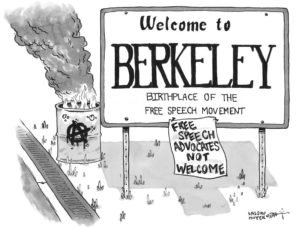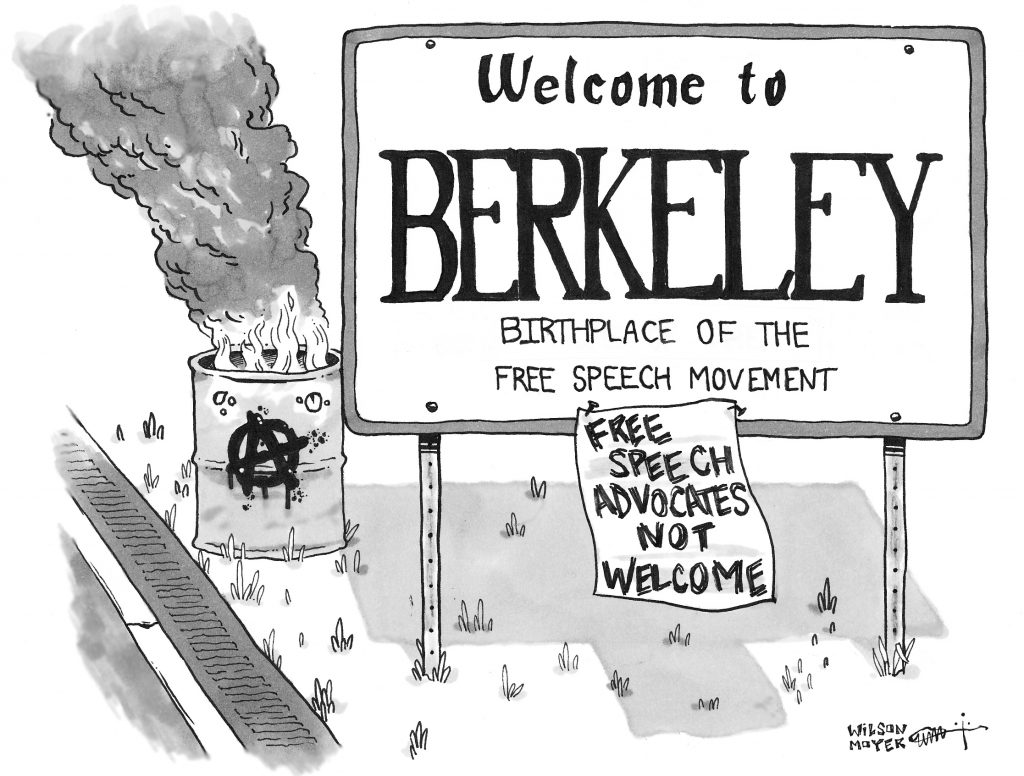By Alice Bello
We are quick to revel in our right to speak our minds without fear of reprisal. Years of fighting have allowed us to give our opinion on things ranging from the most simple of subjects to politics, books, and movies, yet the second someone dares disagree with us, we are the first to cry bloody murder.
In the western world, freedom of speech is viewed as one of our fundamental rights, but lately we have been divested of that freedom. I’ve seen it at Sciences Po. Anything related to gender rights—a subject particularly close to my heart—is constantly prone to a limitation of expression. I’m a feminist (I can already see your eyes rolling to the back of your head), but no one loves a good sexist joke as much as I do. Try making this kind of joke at Sciences Po and you’ll be rebuked immediately, but if someone tells a good joke about a woman’s place being in the kitchen, I’ll laugh. Some may claim that that would be proof of me being oppressed by the patriarchy, but that person would be wrong.
We live in an age of political correctness, where the mere mention of an extreme opinion that could offend someone is shot down. We live in an age where the University of California, Berkeley’s ‘Free Speech Week’ was cancelled due to protests against speakers such as Milo Yiannopoulos and Steve Bannon. Sure, their speeches would probably have been laced with extremist views that a majority of students would have disagreed with, but that should be all the more incentive to actually listen to them. There’s a reason why these types of radical opinions arise, and forcing them to shut up is only going to stir their discontent. Rather than fighting those who speak the words, fight the ideas they are disseminating.
Past conversations I’ve had at Sciences Po linked to politics have turned sour when the mention of whom one has voted for has led to appellations of “fascist” or “communist.” Granted, this isn’t the best response to a dissenting view, but the freedom of speech is a double-edged sword: at some point, you have to accept that the price you pay for speaking your mind can be met with anything from reticence to viciousness.
One thing to take away from these debates is that the political views of those you don’t agree with are no less valid than your own. Listen to those you don’t agree with and you just might be surprised to find common ground. We’re at an age where we should be confronted to opposing views. What better way to push our reflection, to force us to think clearly and often about our positions and what we believe in?
Recently, a second-year Sciences Po Paris student named Mateï published a video on YouTube regarding the recent Harvey Weinstein scandal. In the video, he states that his freedom of speech has been quelled repeatedly, and that this video will finally allow him to speak his mind.
Speak his mind he does, droning on and on about how the women who are accusing Harvey Weinstein of sexual assault and harassment shouldn’t receive pity because they consciously performed lascivious acts on Weinstein in exchange for millions of dollars. The Sciences Po student states that women should have to claim responsibility for their actions, because according to him, they gave consent to Weinstein. Mateï doesn’t stop there: he declares that, as a society, only the victims of sexual assault that have spoken up about the crime immediately after it’s taken place should receive pity and support.
Mateï’s statements are profoundly disheartening and do a disservice to all women, especially when you see the avalanche of comments coming from men that laud his honesty and view him as a beacon of truth. I would like nothing more than to see that video deleted so that its influence is restricted, but at the same time, he has the freedom of speech. Should we really limit his expression on the basis that it’s offensive? Any person with common sense knows that his claims are false, so aren’t we just giving him power by asking for the video to be taken down?
Freedom of speech is all about power. The second we allow ourselves to be offended by menial comments, by paltry jokes, we give power to those statements and the meaning behind them. Believe it or not, it’s empowering to make light of serious subjects without the feeling that someone is breathing down our necks, exerting a subtle pressure on us not to do so.
This is an entirely personal interpretation of freedom of speech. I’m privileged enough to not have to worry about hate crimes, slanderous statements or slurs. However, I’m not jumping the gun. I’m not saying that homosexuals should be subject to homophobic comments, or that minorities should have to deal with racist slurs. I just think that we could all do with a little bit less political correctness.
Perhaps John Stuart Mill sums it up best, in his book entitled On Liberty: “speech should be free to the extent to which it does not cause actual harm to others.” When you think about it, it’s a much less violent form of remonstration than, say, murder. We need freedom of speech in this age of political correctness. If we lose our freedom of speech, our right to debate, reflect and dispute, then there really is nothing left to fight for.

Cartoon by: Wilson Moyer, Feb 7th 2017. The DM Online: http://thedmonline.com/berkeley-riots/
Alice is a Parisian New Yorker or a New Yorkan (is that a word?) Parisianer (that’s probably not a word either) hoping to conquer the world of journalism one day. Interests include drinking coffee, reading the New York Times, and reading the New York Times while drinking coffee. The Parisian New Yorker runs one Thursday every month.
Other posts that may interest you:
- The Trouble with ‘Ecocide’
- Carbon dioxide removal – hit or miss?
- Local Victories for Turkish Opposition — A Sign of Hope?
- Are France and Japan a Mismatch Made in Heaven?
- A Reflection on Dark Tourism
Discover more from The Sundial Press
Subscribe to get the latest posts sent to your email.





